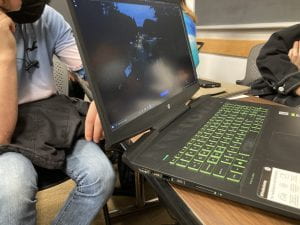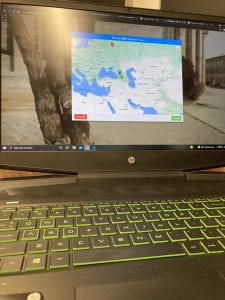City Guesser 2-Players
My appropriation game is a modified version of a very popular game online called City Guesser. In the game City Guesser, players would observe a video playing on their screen and based on the video that’s playing, try to guess the location of the video. There are buttons on the top right of the video that can help players by controlling the video so that they can get more information. After guessing where the location may be, the game will tell the players how far they are away from the actual location of the video. There is no score or map limit, so players are free to continue guessing and playing however long they want.
My Modified Version of City Guesser:
Players:
- 2 Players
Rules:
- At the start of the game, position the players so that Player 1 cannot look at the video and Player 2 can. Player 2 must give as much detailed information as possible to Player 1 about the video, however, Player 2 cannot make the guess about where they think the place may be. They can give suggestive guesses but ultimately, Player 1 makes the decision about where they think the place is.
Modifications/Setting Changes:
These are additional rules that the players can add to make the game more challenging
- Limited Amount of Questions
- Time Limit
- The Player describing may not suggest any country
- The Player describing may not say what language is spoke or shown in the video
Artist Statement
Throughout the process of forming an idea of appropriating a game, I was mainly focused creating ways to make an original game more frustrating, difficult, or unique. Yoko Ono’s piece, White Chess, really inspired me to somewhat appropriate a game where there was a loss of information. In Yoko Ono’s game, the lost of information was what game pieces the players control where if the players do not completely remember all of their piece’s positions, then this game essentially becomes impossible to play. Likewise, when appropriating my game, I realized that by taking away a player’s vision and hearing, my game creates the same type of challenge as White Chess in terms of a mental challenge where that player must constantly infer about the given information to formulate and achieve the goal of my game. Unlike Yoko Ono’s piece, the difficulty in mine comes from the coordination between players and whether the descriptive information correctly leads the other player to the destination or that information becomes too opinionated to the point where other player wrongly infers about the location. These types of interaction between players interests me where I believe in the idea that enjoyable or good friction within challenging games creates some sort of satisfaction or euphoric feeling when overcoming these hurdles. Although the players might not get the right location or be remotely close during their first attempt, after multiple attempts, the players would start to understand certain tips or tricks that would help each other, possibly forming some interesting way of communication exclusive to both of them, overcoming each obstacle until they finally have a guess that is close to the location. However, to constantly facilitate these challenges and feelings, I felt the need to create more modifications or settings to my games that would ultimately create more obstacles, which once again, create the sort of interactions that I would like to see in a my game.
Documentation:
Peers in my class playing my modified version of City Guesser.

One player is describing the location to the other player.

The player choosing the where they think the place may be.

The final result of the video’s location.
